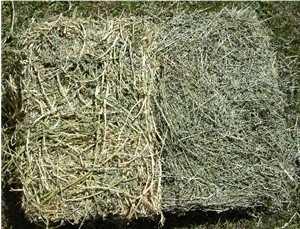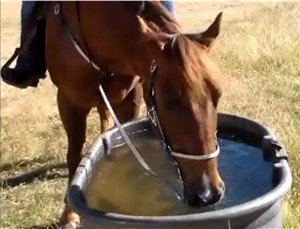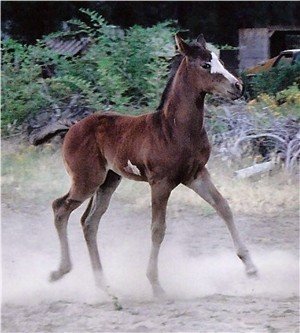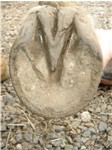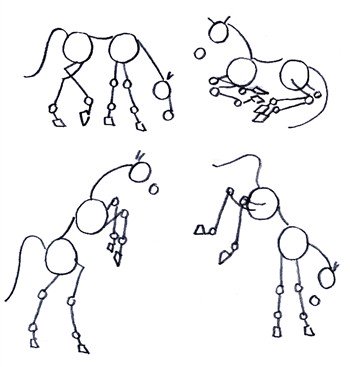Horse Grain: Types and Best Feed Practices
Horse grain adds extra energy and other nutrients your horse's diet. Hard working horses do not thrive on hay alone. They need more calories than can be found in hay.
Horses with increased energy needs include: pregnant mares, lactating mares, growing foals and hard working horses; endurance horses, race horses, working ranch horses, pack animals and so on. Get the inside scoop on horse feed concentrates.
How much grain should I feed my horse?
All horse feed rations, including horse grain, is dependent upon your horse’s size, age and energy requirements. ‘Feed rations’ is the term used to describe how many pounds of horse food an equine eats daily.
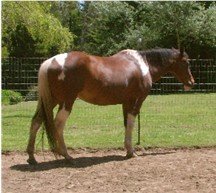
My 19 year old, 1200 lb mare, Hana, does well on alfalfa and 1 lb of grain daily.
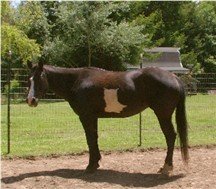
So does Mystic, my daughters 14 year old, 950 lb mare.
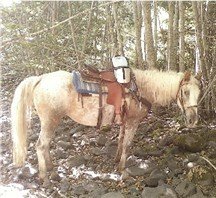
Little Jazzy is 28 years old, 675 lb and going strong! She gets 2 lbs of grain plus rice bran and alfalfa.
A horse will eat about 3% of his body weight in feed daily. For example, a 1000 lb horse will eat 30 lbs of feed a day. 30 lbs is the ‘feed ration’. Most of that feed ration will be given as hay (roughage) and a much smaller portion of that ration will be given as grain feed.
Horse weight measure tapes can be found a feed stores and tack shops.
To determine how much to feed your horse, find out how much your equine weighs. You can do this using a special tape measure designed just for measuring horses’ weight and height. Grab a calculator and multiply his weight by .03 (or 3%). This gives you a starting point on how much horse food your critter will need.
Less than half of the total food weight should be feed as horse grain. The average 1000 lb horse does well on 1-8 lbs of grain a day, but can get as much at 15 lbs if he is working extremely hard. You will need to adjust your grain rations according to your horses individual needs. Bear in mind:
- Hard working horses need more grain calories than lightly used horses
- 'Easy keepers' of any breed and age need much less grain than other horses
- Pregnant mares have increased needs
- Pound for pound, mature horses tend to need less than younger horses
- 'Hard keepers' of any breed and age will consume more grain calories
If you are feeding grass hay or you have a horse with higher energy demands, you may very well need to feed him more grain than we feed our girls! Beet pulp is also an excellent, easy to digest, energy source that can be added to your horses diet.
Too Much of a Good Thing
Not all horses need grain. But grain is an essential part of a working horses diet. Great care should be taken not to over feed grains to your horse. Grain over doses can cause colic, equine founder or laminitis in equines, and are a major cause of bone problems (epiphysitis) in young growing horses.

Introducing Horse Grain Slow and Steady
When in doubt, give small grain feed portions at first, say ½ pound, and then increase the amount slowly. A horse that has not been eating grain and is suddenly fed a large dose; can colic or develop equine laminitis….that can be deadly or debilitating. Once you have established good grain feed portions for your horse, be consistent in the amounts that you feed from day to day. Horses don’t do well with abrupt feed changes.
Grain is best fed in small portions. Give the least amount needed to meet the energy requirements of your horse. Most people feed a ‘scoop’ or a ‘can’ of grain. It’s impossible to know exactly how much that is unless you weigh it at least once! Keep in mind that some grains are heavier than others. If you feed corn one month and rolled oats the next….take a weight measurement.
No No No
- Never more than 5lbs of grain in a single feeding
- Never more than 50% of total ‘feed rations’ in grain – EVER
- Never depend on scoop size to determine feed rations
Yes Yes Yes
- Feed the least amount of grain needed to get the job done
- Be consistent in your grain choices, make changes slowly
- Feed your horses consistent grain amounts
- Feed your horses on a consistent time schedule
- Depend on actual weight of the grain to determine feed rations

Types of Horse Grain
Oats - Corn - Barley - Rye - Rice Bran
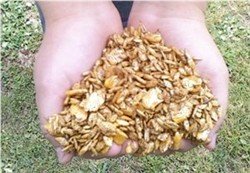 Sweet cob
Sweet cob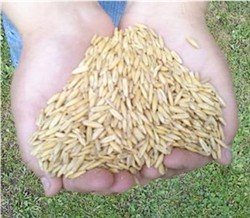 Whole oats
Whole oats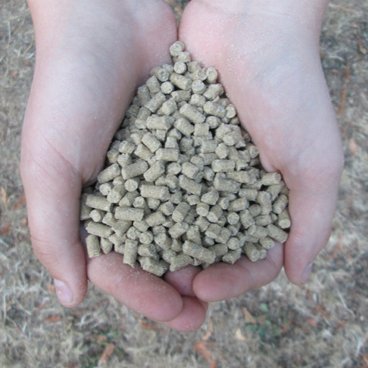 Rice bran
Rice branAll the horse grains are fairly equal in nutritional value. The major difference between them is taste, price and how easily they are digested. Horses will get the most energy and nutritional value from grains that are rolled, crimped or cracked. Finely ground grains can cause digestive problems in horses.
Try to limit sand ingestion by not feeding your horse grains or hay directly off the ground. Use grain feeders, hay bins or ground barriers. Rubber mats or even carpeting placed on the ground can act as a sand barrier. Horses tend to throw their feed around as they rummage for the good bits, so you'll need a good 8’ by 8’ of ground cover for your horse's feeding area.
|
The more processed the grain is, the shorter the shelf life (wheat bran and rice bran go stale faster than whole grains). Never feed grains that show any sign of mold. Mold produces mycotoxins that can kill a horse. Galvanized garbage cans and steel barrels with tight fitting lids make great grain storage containers. They keep moisture and rodents out. Once you have a general idea of how much horse grain feed is needed, you can adjust the rations accordingly to her age, energy requirements and health needs. Take the time to weigh your horse and your feed. That way you won’t just be guessing, you’ll know you have made the best horse feed choices! Remember too, that your vet is a wealth of information. If you have a pregnant horse or a growing foal or a horse that has had laminitis or any other horse food related disease, it is especially important to consult your veterinarian about horse grain feed rations for your equine. For the love of horses…..play it safe! |
More Equine Topics You May Enjoy
How to Draw a Horse
Six easy step by step horse drawing lessons. Learn to draw horse heads and horse hooves too.

